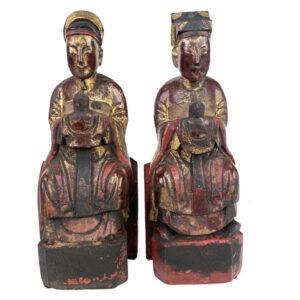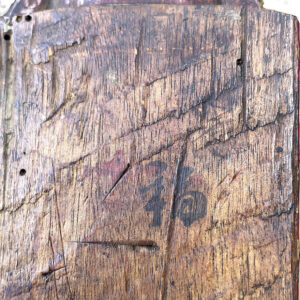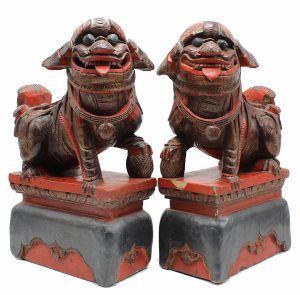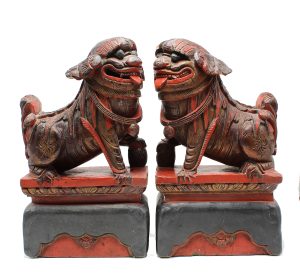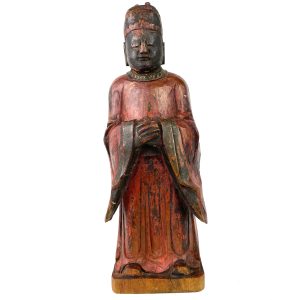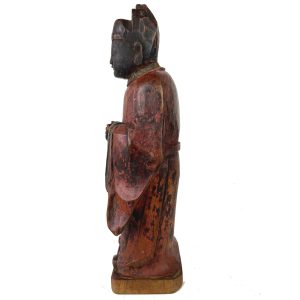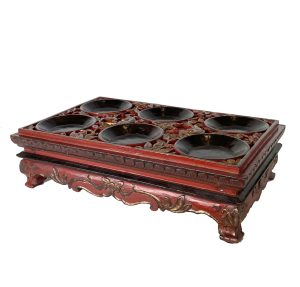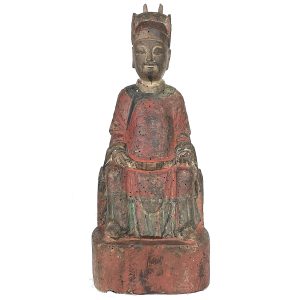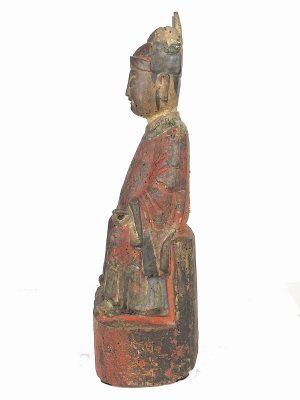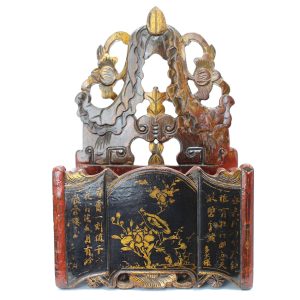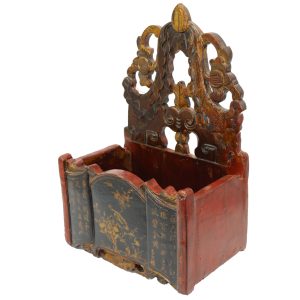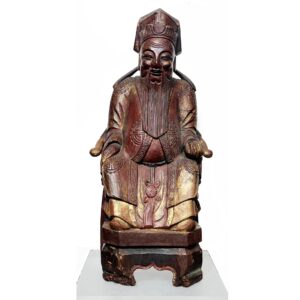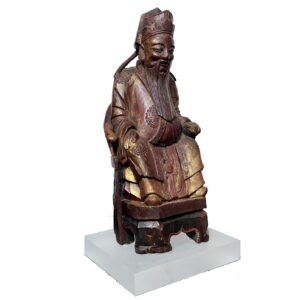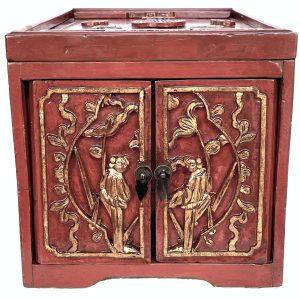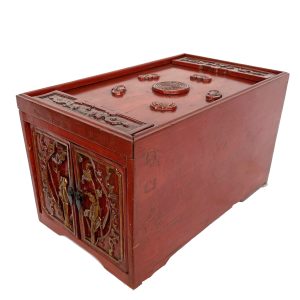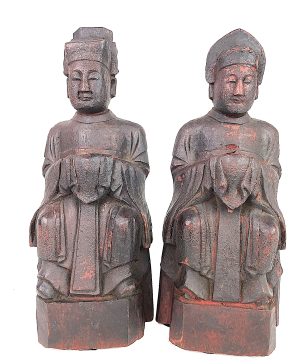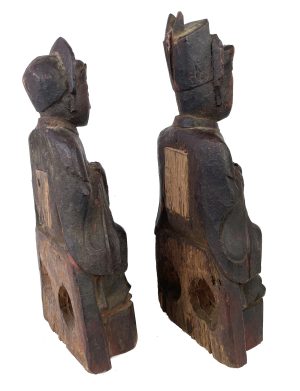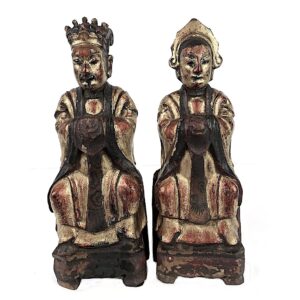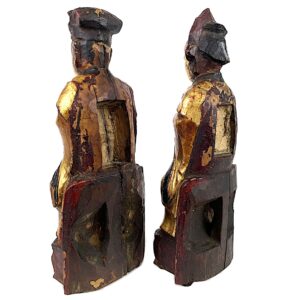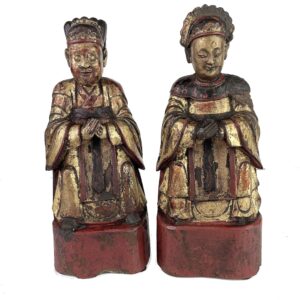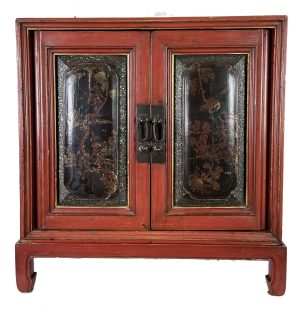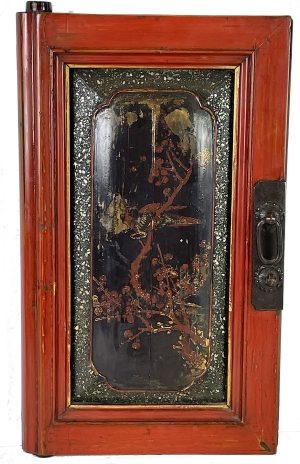Showing 1–12 of 29 results
-
Sale!


$850.00 Original price was: $850.00.$650.00Current price is: $650.00.
H: 7.5″ W: 2.875″ D: 2″ | FREE SHIPPING WITHIN CONTINENTAL U.S.
VA’s most unique and finely crafted Kitchen God couple. Beautifully carved, clasping hu tablets, approachable features, smiling lips. Painted character on base wish for “happiness.” Add positive chi, enhance feng-shui.Unique house warming/wedding gifts.
-
Sale!


$995.00 Original price was: $995.00.$695.00Current price is: $695.00.
H: 12″ D: 7″ D: 7.75″ | FOR SHIPPING INFORMATION CONTACT US AT 213-568-3030
This very fine pair of antique carved males fu lions represents the dual nature of these mythical animals: as protective images they are powerful and fierce, as Buddhist images they are whimsical with smiling faces, dangling tongues, hanging ears and bushy tails. They are extremely well carved with harnesses and bells around their necks, detailed manes and tails on high intricately decorated bases to signal their importance. Perfect for enhancing feng shui in a home or office, large finely decorative wood pairs like this are extremely hard to find.
-
Sale!


$425.00 Original price was: $425.00.$325.00Current price is: $325.00.
Ht: 8.25″ W: 3″ D: 2.125″ | FREE SHIPPING IN CONTINENTAL US
Ancestor figure portrayed as a civilian official standing on a rectangular base with hands together wearing a long civil official’s robe that extends to his shoes.
-
Sale!

$475.00 Original price was: $475.00.$325.00Current price is: $325.00.
H: 5.625″ W: 27.875″ D: 9.75″ | FOR SHIPPING INFORMATION CONTACT US AT 213-568-3030 OR EMAIL [email protected]
This exceptionally crafted and beautiful footed confection mould was most probably a marriage gift from a wealthy family to the newlyweds as seen its symbolisms. It is elaborated and ornately decorated in vibrant reds and gilt with auspicious symbols for fidelity, fertility and happiness with lotuses and pods filled with seeds, bats, paired fish and intertwined vines representing a life pair, having sons, and other marriage wishes.
-
Sale!


$395.00 Original price was: $395.00.$295.00Current price is: $295.00.
H: 13.75″ W: 5.25″ D: 4″ | FREE SHIPPING WITHIN CONTINENTAL U.S.
This ancestor figure portrayed as a Chinese civilian official honors the family with his sign of high status. He grasps his official’s belt, his red robes symbolize fu for auspicious blessings. Unlike many serious officials he is approachable, with a smiling face.
-
Sale!


$350.00 Original price was: $350.00.$295.00Current price is: $295.00.
H: 10.75″ W: 7″ D: 4.5″ | CALL 213-568-3030 OR EMAIL [email protected] FOR SHIPPING.
The auspicious symbols on this charming document holder which are puns for “harmony and unity in marriage” indicate it was it was probably a wedding gift. And would serve that purpose admirably today as a decorative practical accessory and something you won’t find on a wedding registry.
-
Sale!


$745.00 Original price was: $745.00.$595.00Current price is: $595.00.
H: 10.25” W: 4.75” D: 3.625” | FREE SHIPPING WITHin Continental U.S.
Taoist God of Wealth (Caishen) portrayed as benevolent authoritative figure associated with wealth: holds tael, robe with coin decorations, painted with red and gold.
-
Sale!


$385.00 Original price was: $385.00.$325.00Current price is: $325.00.
Ht: 8.5” W: 15” D: 9” | CALL 213-568-3030 OR EMAIL [email protected] FOR SHIPPING COST
Given the auspicious images on this finely crafted red and gilt jewelry box -a lotus and 5 bats surrounding a longevity roundel, it was probably a wedding gift for a fortunate couple as a wish for longevity, fertility, harmony and many and sons.
-
Sale!


$695.00 Original price was: $695.00.$525.00Current price is: $525.00.
H: 7.25 ” W: 3 ” D: 1.625 ” | FREE SHIPPING WITHIN CONTINENTAL U.S.
Finely carved Kitchen God and his wife, mirror images on backless chairs with multi-sided pedestals reflecting reverent and responsibility to protect the home. Naturally darkened lacquer, soft patina. Male with consecration covering, female open with contents. Unique house warming/wedding gift.
-
Sale!


$695.00 Original price was: $695.00.$525.00Current price is: $525.00.
H: 7.75 ” W: 2.875 ” D: 1.875 ” | FREE SHIPPING WITHIN CONTINENTAL U.S.
Husband and wife Kitchen Gods are near mirror images with similar layered gold officials’ robes, clasped hands covered in ritual cloth. Excellent condition, fine patinas. Consecration script remaining in wife’s cavity but not in husband’s.
-
Sale!


$785.00 Original price was: $785.00.$650.00Current price is: $650.00.
H: 7.75″ W: 3.25″ D: 2.375″ | free shipping within Continental U.S.
Finely carved this Kitchen God and his Wife monitor family members from their perch above the stove. Near mirror images with layered gold officials’ robes they symbolically hold tablets to report about the family to the Jade Emperor on Chinese New Year. enhance feng shui. Kitchen Gods especially pairs are now rare and very collectible and make unique wedding and house gifts.
-
Sale!


$450.00 Original price was: $450.00.$325.00Current price is: $325.00.
H: 22 ” W: 21.5 ” D: .12.25 ” | FREE SHIPPING WITHIN CONTINENTAL U.S.!
Small Fujian elm cabinet made for the China’s new wealthy merchant class in 18-1900s . Red lacquer with auspicious symbols for the Five Happinesses: health, wealth, longevity, virtue and a peaceful death. Were often gifts for newlyweds as desire for double happiness and fruitful marriage with sons.
End of content
End of content

